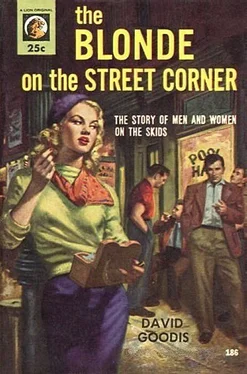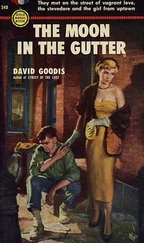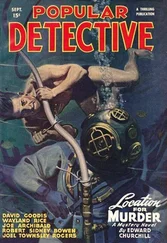“You’re crazy,” George said. “We’ll have the cops in here and we’ll all get locked up, so help me.”
For a while there was quiet.
Then George said, “You better give up the idea.”
Ken looked across the room, at the piano. He said, “A guy’s gotta do something. He’s gotta take his risks. He’s gotta do something.” He shook his head. In a very low voice he said, “Take a chance.”
Again there was quiet for a while.
In the next room Dippy was on the phone. He was saying, “Indeed?”
George and Ken laughed. They went into the next room to listen to Dippy.
In the living room Ralph sat alone and looked out the window, at the gray pavement and the dull black street and the gray sky. He was thinking of when he was sixteen years old and had joined the mineralogy club in high school. He had become very interested in mineralogy. He went down to the Academy of Natural Sciences and read all about the stones. He used to visit a lapidary and ask to see uncut stones. One day the old man there told him where he could find amethyst. The old man claimed that along the banks of the Wissahickon there was amethyst.
Ralph took a trolley and hiked along the Wissahickon. It was winter. The Wissahickon Creek was half-frozen. Ralph walked along the bank of the creek. He was alone. Out here everything was dry and cold and clean. He forgot about the amethyst. He just wanted to walk along by the bank of the creek. Dead leaves swayed in praying mobs around the trunks of bare trees. Everything was still and quiet, except for the clear icy water splashing over the rocks and pebbles in the creek. He walked on, looking at the water, and the trees, and the rocks, and the quiet loveliness of the Wissahickon Creek and its valley, and he wanted to stay here. He wanted to build a cave, beneath one of the big rocks, and there he would stay, all alone, yet not alone, for he would have the crinkling song of the creek, and the defiant song of birds almost frozen yet reluctant to leave the creek and the valley. In his cave in the valley by the creek he would stay always, all alone, yet not alone, and he would have all he wanted.
Remembering that, he longed again for the creek and the valley. He stood up, moved past the window, to the door. He would go again to the Wissahickon.
From the next room Ken said, “Where you going?”
“Nowhere special.”
Into the phone Dippy said, “You mean to say that you don’t know what a system engineer is?”
George and Ken were laughing. Ken said, “Listen to this, Ralph. This is good.”
Ralph had his hand on the doorknob. He started to turn it and then his fingers fell away and he walked toward George and Ken and Dippy.
George said, “Get the details.”
Into the phone Dippy said, “How old are you and how tall and how much do you weigh?”
He cupped his hand over the mouthpiece and turned to his friends and said, “This is something out of the ordinary.”
“Fix it up,” Ken said.
“Saturday night — up here. That’s tomorrow night, ain’t it?” George said.
“We’ll have the house to ourselves,” Ken said.
Ralph murmured, “Count me out.”
“We’ll have them here all night,” George said, while Dippy continued his negotiations over the phone.
“I’m not in on it,” Ralph said.
“Say, what’s wrong with you?” Ken said.
“Nothing.”
“Don’t hand me that.”
“I tell you nothing’s wrong,” Ralph said.
“What are you sore about?”
“Who said I was sore?”
“Well then, what’s the matter?”
“Nothing.”
“I know what it is,” Ken said. “It’s the song we wrote. You’re sore because I’m not sending the song to a music company.”
“I’m not sore about the song,” Ralph said. “I’m not sore about anything.”
George said, “He’s snakebitten.”
“That’s it,” Ken said. “That’s it. You’re snakebitten about something. What is it?”
“Nothing,” Ralph said. He turned away and walked to the front door.
“Hey, wait a minute,” Ken called. “Where you going?” Ralph opened the door and went out.
In his room Ralph bit at a pencil and looked at the blank paper. He was telling himself that if he could fit words to a tune, then maybe Ken could fit a tune to these words. As yet there were no words on the paper. But there soon would be. He knew what he wanted to put down on the paper. The words were rolling around in his mind. He had to put them down on the paper. They would flow from his mind to his arm to his hand to the pencil onto the paper. He would take the words over to Ken who would develop a tune. He was putting the words down now. This was all he wanted to do. He wanted to be here alone in his room, putting the things that were in his mind into words that would crawl from the pencil onto the paper. He crossed out some words and then he looked out the window, at the grey sky. And he looked back at the paper, then back at the sky again and saw that the grey was getting deeper. He looked at the words on the paper and he took the paper in his hand and slowly crumpled it up and then tore it in little pieces. He opened the window and threw the pieces of paper out and watched them sail down to the alley, a wide-spread fleet.
He walked out of the room.
At nine o’clock Edna looked out the window and saw the dark, narrow, empty street. Turning quickly away from the window, she told herself that she was foolish. She sighed and tried to tell herself that one always sighed when one was so very tired. She had walked a lot today. Up and down the downtown streets. In and out of one place after another. Not a chance. Nothing. Not even a promise of something in the future. Everything was taken. There were so many girls who were out after jobs. Maybe there would be something tomorrow. There had to be something. She had to find something. Her father had not yet landed a job. The money was going to run out soon and she had to find something, anything, just so it was something. She sighed again. The soles of her feet were burning and she thought of all the walking that she would do tomorrow, and the soles of her feet burned more. She looked out the window again and then glanced at the battered alarm clock that rested on a chair. It was twenty minutes past nine.
He was not coming here tonight. He was not coming here at all. She would never see him again.
She stood up. The house was cold. But even so it felt warm and sticky and close in here. She wondered why that was. She wondered why she wanted to go outside. She went into the next room and put on her torn coat and then went out. And as she was walking down the steps she saw him.
Leaning against the wall, a few houses away, looking at the ground.
She walked toward him.
He looked up and he was startled, and there was flight in his eyes, and he started to turn away.
“Oh, Ralph, please don’t go.”
“I—”
“Why are you standing out here, like this?”
“I don’t know.”
“You don’t even have an overcoat on. Aren’t you cold?”
“No.”
“You’re cold, Ralph. I can see. Come in my house.”
“No — I’ll be going.”
“Please don’t, Ralph. You came down here to see me, didn’t you?”
“Yes.”
“And you were here at nine o’clock, just like you said you’d be, even though you said later that—”
“Well, I—”
“You were here at nine, weren’t you? Since nine you were standing out here like this, waiting.”
“I’m going home now.”
“Please don’t, Ralph. Please come in my house.”
“I don’t want to.”
“Yes, you do. I know you do. And it’s warm in there. Well anyway, it’s warmer than it is out here. Why haven’t you got your overcoat on? You had one on last night. Did you lose it?”
Читать дальше












